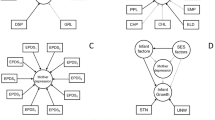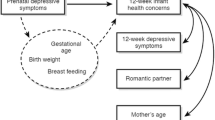Abstract
Women’s postnatal depressive symptoms have been associated with many adverse outcomes for children. The current study examined the frequency association with relative risk between postnatal depressive symptoms and mothers’ use of preventative infant health practices. The study used the Edinburgh Postnatal Depression Scale (EPDS) and Parental Health and Depression Questionnaire (PHDQ) to identify women’s depressive symptoms in a prospective longitudinal sample of 134 high-risk non-white mothers receiving well-baby health services. Unadjusted frequency comparisons examined the effect of women’s postnatal depressive symptoms on infant outcomes. Results found that compared to 60 women without postnatal depressive symptoms, 74 women with symptoms engaged in significantly fewer well-child health-visits, were less likely to use home safety devices or place their infants in the preferred back-to-sleep position, and did not complete immunizations. Depressed women were also more likely to lack knowledge of nurturing and sensitive parenting, use corporal punishment and inappropriate foods, and to show poor parenting practices. These findings provide additional supportive evidence that more efforts are needed to identify and assess women’s depressive symptoms to promote health and safety of young children. Methodological limitations and recommendations for future research are addressed.
Similar content being viewed by others
References
American Academy of Pediatrics (AAP). (1996). Task force report on infant positioning and SIDS: Update. Pediatrics, 98, 1216–1218.
American Academy of Pediatrics (AAP). (2000). Committee on practice and ambulatory medicine report: Recommendations for preventative pediatric health care. Pediatrics, 105, 645–646. doi:10.1542/peds.105.3.645.
American Academy of Pediatrics (AAP) Committee on Nutrition. (2001). The use and misuse of fruit juices in pediatrics. Pediatrics, 107, 1210–1213. doi:10.1542/peds.107.5.1210.
American Academy of Pediatrics (AAP). (2003). Policy statement: Family-centered care and the pediatrician’s role. Pediatrics, 112, 691–696. doi:10.1542/peds.112.3.691.
American Academy of Pediatrics (AAP). (2004). Pediatric nutrition handbook (5th ed.). Illinois: Elk Grove Village.
Bavolek, S. J., & Keene, R. (1999). Adult-Adolescent Parenting Inventory (AAPI-2). Eau Claire, WI: Family Development Resources.
Beck, C. T. (2001). Predictors of postpartum depression: An update. Nursing Research, 50, 275–285. doi:10.1097/00006199-200109000-00004.
Brown, G. W., & Davidson, S. (1978). Social class, psychiatric disorders of mothers and accidents in children. Lancet, 1, 378–380. doi:10.1016/S0140-6736(78)91097-8.
Casey, P., Goolsby, S., Berkowitz, C., Frank, D., Cook, J., Cutts, D., et al. (2004). Maternal depression, changing public assistance, food security, and child health status. Pediatrics, 113, 298–304. doi:10.1542/peds.113.2.298.
Center for Disease Control and Prevention. (1999). Progress in reducing risky infant sleeping positions: 13 states, 1996–1997. MMWR. Morbidity and Mortality Weekly Report, 48, 878–882.
Centers for Medicare and Medicaid Services. (2003). Early and periodic screening, diagnosis, and treatment (EPSDT): Retrieved April 10, 2007, from http://cms.hhs.gov/medicaid/epsdt.
Chung, E. K., McCollum, K. F., Elo, I. T., Lee, H. J., & Culhane, J. F. (2008). Maternal depressive symptoms and infant health practices among low-income women. Pediatrics, 113, 523–529. doi:10.1542/peds.113.6.e523.
Civic, D., & Holt, V. L. (2000). Maternal depressive symptoms and child behavior problems in a nationally representative normal birth-weight sample. Maternal and Child Health Journal, 4, 215–221. doi:10.1023/A:1026667720478.
Cox, J. L., & Holden, J. (Eds.). (1994). Perinatal psychiatry: Use and misuse of the Edinburgh Postnatal Depression Scale. London: Gaskell, Royal College of Psychiatrists.
Cox, J. L., Holden, J., & Sagovsky, R. (1987). Detection of postnatal depression: Development of the 10-item Edinburgh Postnatal Depression Scale. The British Journal of Psychiatry, 150, 782–786.
Cox, J. L., Murray, D., & Chapman, G. (1993). A controlled study of the onset, duration, and prevalence of postnatal depression Scale. The British Journal of Psychiatry, 163, 27–31.
Dodge, K. A. (1990). Developmental psychopathology in children of depressed mothers. Developmental Psychology, 26, 3–6. doi:10.1037/0012-1649.26.1.3.
Downey, G., & Coyne, J. C. (1990). Children of depressed parents: An integrative review. Psychological Bulletin, 108, 50–73. doi:10.1037/0033-2909.108.1.50.
D’Souza-Vazirani, D., Minkovitz, C. S., & Strobino, D. M. (2005). Validity of maternal report of acute health care use for children younger than 3 years. Archives of Pediatrics and Adolescent Medicine, 159, 167–172. doi:10.1001/archpedi.159.2.167.
Field, T. (1995). Psychologically depressed parents. In M. H. Bornstein (Ed.), Handbook of parenting (Vol. 4, pp. 85–99). Lawrence Earlbaum Associates.
Field, T. (1998). Emotional care of the at-risk infant: Early intervention for infants of depressed mothers. Pediatrics, 102, 1305–1310.
Fleming, A. S., Ruble, D. N., Flett, G. L., & Van Wagner, V. (1990). Adjustment in first-time mothers: Changes in mood and mood content during early postpartum months. Developmental Psychology, 26, 137–143. doi:10.1037/0012-1649.26.1.137.
Garcia-Esteve, L., Ascaso, C., Ojuel, J., & Navarro, P. (2003). Validation of the Edinburgh Postnatal Depression Scale (EPDS) in Spanish mothers. Journal of Affective Disorders, 75, 71–76.
Halfon, N., & McLearn, K. T. (2002). Families with children under 3: What we know and implications for results and policy. In N. Halfon, K. T. McLearn, & M. A. Schuster (Eds.), Childrearing in America: Challenges facing parents with young children (pp. 367–412). Cambridge University Press.
Heneghan, A. M., Johnson Silver, E., Bauman, L. J., Westbrook, L. E., & Stein, R. E. K. (1998). Depressive symptoms in inner-city mothers of young children: Who is at risk? Pediatrics, 102, 1394–1400. doi:10.1542/peds.102.6.1394.
Heneghan, A. M., Johnson Silver, E., Bauman, L. J., Westbrook, L. E., & Stein, R. E. K. (2000). Do pediatricians recognize mothers with depressive symptoms? Pediatrics, 106, 1367–1373. doi:10.1542/peds.106.6.1367.
Herrick, H. (2002). Postpartum depression: Who gets help? Raleigh, NC: Department of Health and Human Services State Center for Health Statistics. Statistical Brief 24.
Hiscock, H., & Wake, M. (2001). Infant sleep problems and postpartum depression: A community-based sample. Pediatrics, 107, 1317–1322. doi:10.1542/peds.107.6.1317.
Jevitt, C., Zapata, L., Harrington, M., & Berry, E. (2006). Screening for Perinatal with limited psychiatric resources. Journal of the American Psychiatric Nurses Association, 11, 359–363. doi:10.1177/1078390305284530.
Keating, J. P., Schears, G. J., & Dodge, P. R. (1991). Oral water intoxication in infants: An American epidemic. American Journal of Diseases of Children, 145, 985–990.
Lanzi, R. G., Pascoe, J. M., Keltner, B., & Ramey, S. L. (1999). Correlates of maternal depressive symptoms in a national Head Start Program sample. Archives of Pediatric and Adolescent Medicine, 153, 801–807.
Lumley, J., Austin, M. P., & Mitchell, C. (2004). Intervening to reduce depression after birth: A systematic review of the randomized trials. International Journal of Technology Assessment in Health Care, 20, 128–144. doi:10.1017/S0266462304000911.
Lyons-Ruth, K., Easterbrook, M. A., & Cibelli, C. D. (1997). Infant attachment strategies; infant mental lag, and maternal depressive symptoms: Predictors of internalizing and externalizing problems at age 7. Developmental Psychology, 33, 681–692. doi:10.1037/0012-1649.33.4.681.
Lyons-Ruth, K., Wolfe, R., Lyubchik, A., & Steingard, R. (2002). Depressive symptoms in parents of children under age 3: Sociodemographic predictors, current correlates, and associated parenting behaviors. In N. Halfon, K. T. McLearn, & M. A. Schuster (Eds.), Childrearing in America: Challenges facing parents with young children (pp. 217–259). Cambridge: Cambridge University Press.
Luoma, I., Tamminen, T., Kaukonem, P., Laippala, P., Puura, K., Salmelin, R., et al. (2001). Longitudinal study of maternal depressive symptoms and child well-being. Journal of the American Academy of Child and Adolescent Psychiatry, 40, 1367–1374. doi:10.1097/00004583-200112000-00006.
Mandl, K. D., Troncik, E. Z., Brennan, T. A., Alpert, H. R., & Homer, C. J. (1999). Infant health care use and maternal depression. Archives of Pediatrics and Adolescent Medicine, 153, 808–813.
Martinez-Schallmoser, L., Telleen, S., & Macmullen, N. J. (2003). The effect of social support and acculturation on postpartum depression in Mexican American women. Journal of Transcultural Nursing, 14, 329–338.
McLearn, K. T., Minkovitz, C. S., Strobino, D. M., Marks, E., & Hou, W. (2006). Maternal depressive symptoms at 2 to 4 months post partum and early parenting practices. Archives of Pediatric and Adolescent Medicine, 160, 279–284.
McLennan, J. D., & Kotelchuck, M. (2000). Parental prevention practices for young children in the context of maternal depression. Pediatrics, 105, 1090–1095. doi:10.1542/peds.105.5.1090.
Minkowitz, C. S., Strobino, D., Scharfstein, D., Hou, W., Miller, T., Mistry, K. B., et al. (2005). Maternal depressive symptoms and children’s receipt of health care in the first three years of life. Pediatrics, 115, 306–314. doi:10.1542/peds.2004-0341.
Murray, D., Cox, J. L., Chapman, G., & Jones, P. (1993). Childbirth: Life event or start of a long term difficulty? Further data from the Stoke-on-Trent-controlled study of postnatal depression. The British Journal of Psychiatry, 166, 595–600.
Murray, D., Fiori-Cowley, A., Hooper, R., & Cooper, P. (1996). The impact of postnatal depression and associated adversity on early mother-infant interactions and later infant outcomes. Child Development, 67, 2512–2526. doi:10.2307/1131637.
Murray, D., Woolgar, M., Cooper, P., & Hipwell, A. (2001). Cognitive vulnerability to depression in 5-year old children of depressed mothers. Journal of Child Psychology and Psychiatry and Allied Disciplines, 42, 891–899. doi:10.1111/1469-7610.00785.
O’Malley, A. S., Forrest, C. B., & Miranda, J. (2003). Primary care attributes and care for depression among low-income African American women. American Journal of Public Health, 93, 1328–1334.
Orr, S. T., James, S. A., & Blackmore Prince, C. (2002). Maternal prenatal depressive symptoms and spontaneous preterm births among African-American women in Baltimore, Maryland. American Journal of Epidemiology, 156, 797–802. doi:10.1093/aje/kwf131.
Richters, J. E. (1992). Depressed mothers as informants about their children: A critical review of the evidence for distortion. Psychological Bulletin, 112, 485–499. doi:10.1037/0033-2909.112.3.485.
Roberston, A. S., Rivara, F. P., Ebel, B. E., Lymph, J. F., & Christakis, D. A. (2005). Validation of parent self reported home safety practices. Injury Prevention, 11, 209–212. doi:10.1136/ip. 2005.009019.
Schochet, P. Z. (2008). Guidelines for multiple testing in experimental evaluations of educational interventions. Princeton, NJ: Mathematica Policy Research, Inc.
Shalowitz, M. V., Berry, C. A., Quinn, K. A., & Wolf, R. L. (2001). The relationship of life stressors and maternal depression to pediatric asthma morbidity in a subspecialty practice. Ambulatory Pediatrics, 1, 185–193. doi :10.1367/1539-4409(2001)001<0185:TROLSA>2.0.CO;2.
Small, R., Brown, S., Lumley, J., & Astbury, J. (1994). Missing voices: What women say and do about depression after childbirth. Journal of Reproductive and Infant Psychology, 12, 89–103. doi:10.1080/02646839408408872.
Small, R., Lumley, J., Donohue, L., Potter, A., & Waldeström, U. (2000). Randomized controlled trial of midwife led debriefing to reduce maternal depression after operative child birth. British Medical Journal, 321, 1043–1047. doi:10.1136/bmj.321.7268.1043.
Tabachnick, B. G., & Fidell, L. S. (2007). Using multivariate statistics. Pearson: Allyn & Bacon.
Teissendre, F., & Chabrol, H. (2004). A study of the Edinburgh Postnatal Depression Scale (EPDS) on 859 mothers: Detection of mothers at risk for postpartum depression. L’Encephale, 30, 376–381. doi:10.1016/S0013-7006(04)95451-6.
Tronick, E. Z., & Weinberg, M. K. (1997). Depressed mothers and infants: Failure to form dyadic states of consciousness. In L. Murray & P. Cooper (Eds.), Postpartum depression and child development (pp. 54–81). NY: Guilford.
van Doesum, K. T., Riksen-Walraven, J. M., Hosman, C. M., & Hoefnagels, C. (2008). A randomized controlled trial of a home-visiting intervention aimed at preventing relationship problems in depressed mothers and their infants. Child Development, 79, 547–561. doi:10.1111/j.1467-8624.2008.01142.x.
Weissman, M. M., Warner, V., Wickramaratne, P., Moreau, D., & Olson, M. (1997). Offspring of depressed mothers: 10 years later. Archives of General Psychiatry, 54, 932–940.
Yonkers, K. A., Ramin, S. M., Navarrete, C. A., Carmody, T., March, D., Heartwell, S. F., et al. (2001). Onset and persistence of postpartum depression in an inner-city maternal health clinic system. The American Journal of Psychiatry, 158, 1856–1863. doi:10.1176/appi.ajp. 158.11.1856.
Zajicek-Farber, M. L. (2008). Building practice evidence for parent mentoring during home-visiting in early childhood. Research on Social Work Practice (under review).
Acknowledgements
This study was supported by partial funding derived from the collaborative partnership between the National Catholic School of Social Service, The Catholic University of America; Lt. Joseph P. Kennedy Institute of the Catholic Community Services, and Perry Family Health Center of Providence Hospital in Washington, DC, which created the original parent mentoring service project and was funded by a grant from Department of Education, Office of Educational Research and Improvement (R305T010754-02). On behalf of the project partnership, the author expresses gratitude to the participating families and collaborative partners.
Author information
Authors and Affiliations
Corresponding author
Rights and permissions
About this article
Cite this article
Zajicek-Farber, M.L. Postnatal Depression and Infant Health Practices Among High-Risk Women. J Child Fam Stud 18, 236–245 (2009). https://doi.org/10.1007/s10826-008-9224-z
Received:
Accepted:
Published:
Issue Date:
DOI: https://doi.org/10.1007/s10826-008-9224-z




